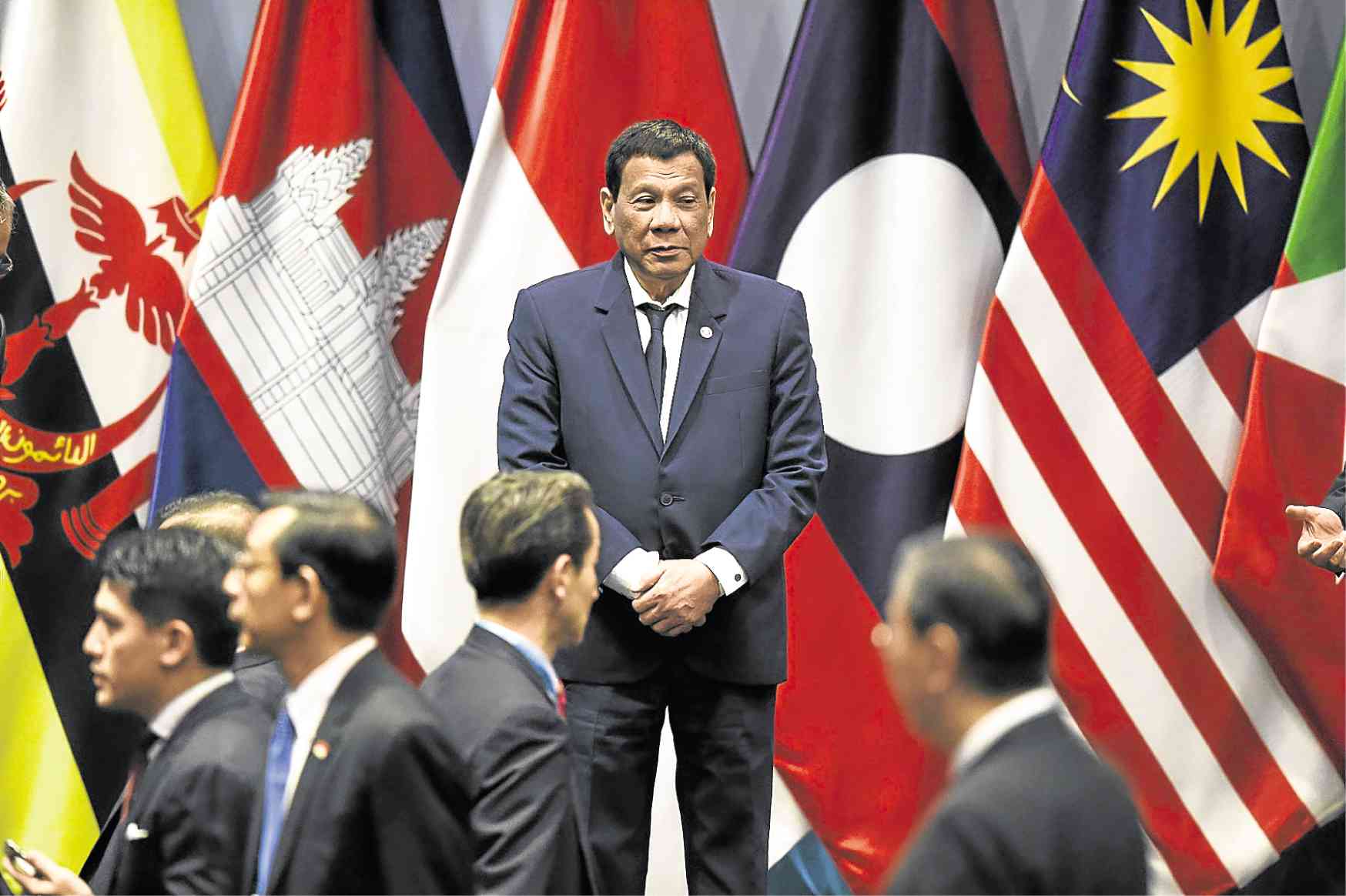South China Sea row: Land reclamation worries Asean

ASEAN SUMMIT IN SINGAPORE Leaders of the Association of Southeast Asian Nations (Asean) are calling for a peaceful resolution to conflicting territorial claims in the South China Sea. Among those who attended the 33rd Asean Summit was President Duterte. —AFP
SINGAPORE — The Association of Southeast Asian Nations (Asean) has expressed concern over land reclamation in the disputed South China Sea, saying the activity undermines peace in the region.
The regional bloc issued a statement through the Asean chair, Singapore Prime Minister Lee Hsien Loong, in which it took note of reclamation in the contested waters.
“We discussed the matters relating to the South China Sea and took note of some concerns on the land reclamations and activities in the area, which have eroded trust and confidence, increased tensions and may undermine peace, security and stability in the region,” it read.
The statement, issued toward the end of the 33rd Asean Summit, did not mention China, which has undertaken land reclamation on islets being claimed by the Philippines and other countries.
China, which claims virtually all of the South China Sea, has built military bases on the disputed outcrops and has intimidated fishermen and naval vessels from rival countries.
Tensions have soared with rival claimants such as Vietnam, the Philippines and Taiwan, as well as the United States, which has traditionally been the dominant military power in the area.
Peaceful resolution
In the statement, Asean leaders stressed the importance of arriving at a peaceful resolution to the conflicting territorial claims in the South China Sea.
“We reaffirmed the need to enhance mutual trust and confidence, exercise self-restraint in the conduct of activities and avoid actions that may further complicate the situation, and pursue peaceful resolution of disputes in accordance with international law, including the 1982 United Nations Convention on the Law of the Sea (Unclos),” they said.
Asean also emphasized the importance of nonmilitarization and self-restraint in the activities of all claimants, including the Declaration of Conduct of Parties in the South China Sea.
Respect for legal processes
The regional bloc warned that such activities “could further complicate the situation and escalate tensions in the South China Sea.”
Asean also renewed its commitment to promoting peace, security and stability in the region and the peaceful resolution of disputes without using threat or force.
“We reaffirmed our shared commitment to maintaining and promoting peace, security and stability in the region, as well as to the peaceful resolution of disputes, including full respect for legal and diplomatic processes, without resorting to the threat or use of force, in accordance with the universally recognized principles of international law, including the 1982 Unclos,” it said.
During the Philippines’ chairmanship of the Asean in 2017, the chair’s statement of President Duterte took note of the “improving relations between Asean and China.”
Last year, the chair’s statement did not directly refer to China’s reclamation and military buildup in the South China Sea. Neither did it include a statement of “concern” over such activities.
No warships
Managing conflict in the South China Sea is a perennial concern.
The region is a potential flash point, and a huge concern for the United States and other countries that rely on the right of passage for shipping.
Malaysian Prime Minister Mahathir Mohamad said Asean leaders discussed the need for restraint in the area.
“We all agreed on ways and means not to increase tensions in the South China Sea. And that means not bringing in warships and allowing for freedom of navigation,” Mahathir told reporters.
“Small patrol boats are needed to deal with piracy, mainly, but big warships may cause incidents and that will lead to tension.”
Asked about the reaction by the United States, which is committed by treaty to defending allies in the region, Mahathir said: “Mr. Pence sounds quite reasonable and he says that President Donald Trump is concerned about the situation.”
Duterte, who has relaxed his country’s stance on Beijing’s claims to islands also claimed by Manila, said it also was crucial that the countries involved finish work on a “code of conduct” to help prevent misunderstandings that could lead to conflict. —REPORTS FROM JULIE M. AURELIO AND AP